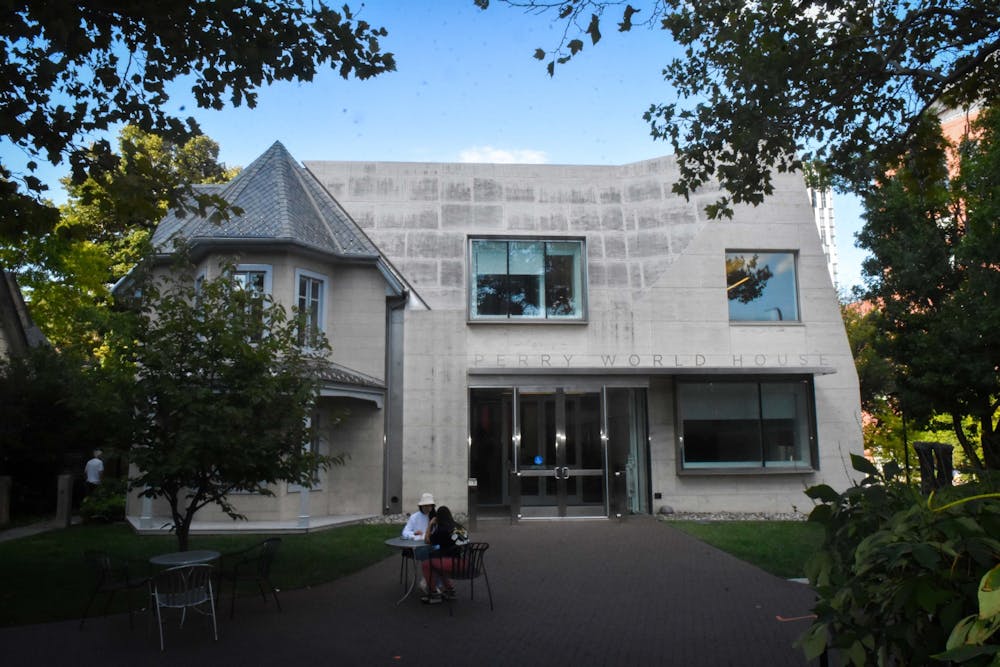
The Perry World House will host three Belizean Maya activists to discuss the history of Indigenous rights, ongoing land negotiations, and the future of the Maya People.
The event, “Decolonize the Future: Defending Indigenous Rights and Lands,” will feature activists Cristina Coc, Pablo Mis, and Filiberto Penados, and will take place from 4 p.m. to 5 p.m. on Oct. 11 in a hybrid format via the World Forum and Zoom. Richard Leventhal, executive director of the Penn Cultural Heritage Center of the Penn Museum, will moderate the panel.
“We’re going to start out broadly with a conversation about Indigenous rights worldwide,” Leventhal said. “Then, [they’ll] focus on what they’re doing in Belize, how they’ve been able to make strides forward in terms of legal issues. The third issue is going to be about how they’ve been able to make progress, not just in winning the legal battles, but actually implementing it on the ground.”
Coc, a Q’eqchi’ Maya leader, works to spread Q’eqchi’ fluency and serves as the founder and program director of the Julian Cho Society — an organization working to promote the environmental conservation and rights of Belizean Indigenous People.
Mis is the program director for the Maya Leaders Alliance and Toledo Alcaldes Association, which successfully litigated Belizean law to establish the 2015 Caribbean Court of Justice Judgment affirming that Maya land rights constitute equal legitimacy to other property forms in Belize.
Penados is the chair of the Julian Cho Society and co-founder of the Center for Engaged Learning Abroad Belize, and also serves as an associate professor at Galen University where he teaches courses on indigenous education, sustainable development, natural resource management, and more.
“In [the speakers'] work they have to navigate so many institutions and power dynamics,” fifth-year Anthropology Ph.D. student Charlotte Williams said. “Law and the court system can be its own version of violence, so moving in and out of these institutions, I’m interested to know how they've survived those and how it affects their strategies in gaining power over the narration of their story.”
Indigenous land covers at least half of the world’s land, although some expert estimates are as high as 65%, according to the World Resources Institute. Because Indigenous Peoples possess legal ownership to only 10% of the land, the work that the Maya People have accomplished in recent years — from winning legal battles to catalyzing change with the Inter-American Commission on Human Rights — has created implications for the future of land recognition and increased biodiversity protection, according to PWH.
“Particularly [in] Latin America, Indigenous people are losing more and more rights,” Leventhal said. “Leaders such as [Jair] Bolsonaro in Brazil [have] opened up the Amazon. People who have lived there for thousands of years are losing out and being killed.”
Alongside the PWH event, the activists will be speaking at a few other events this week during their stay in Philadelphia. The activists will speak at a Graduate School of Education event, “Teaching Environmental Justice: A Celebration of Writing and Literacy,” which will take place at the Penn Museum on Oct. 15. They will also be speaking at an evening lecture with teachers in the school district of Philadelphia, facilitating conversations about Indigenous issues and rights.
PWH will follow the University’s COVID-19 policies and the hybrid event will be open to the public as well as the Penn community.
“One of the takeaways is that we can all agree upon a just future,” Williams said. “But it takes so much effort and activism, often in the forms of confrontation, that a just future actually happens. That includes demonstration, court cases, [and] dissent, and the event highlights themes and the tools of activism that have been essential in this fight.”
The Daily Pennsylvanian is an independent, student-run newspaper. Please consider making a donation to support the coverage that shapes the University. Your generosity ensures a future of strong journalism at Penn.
Donate







